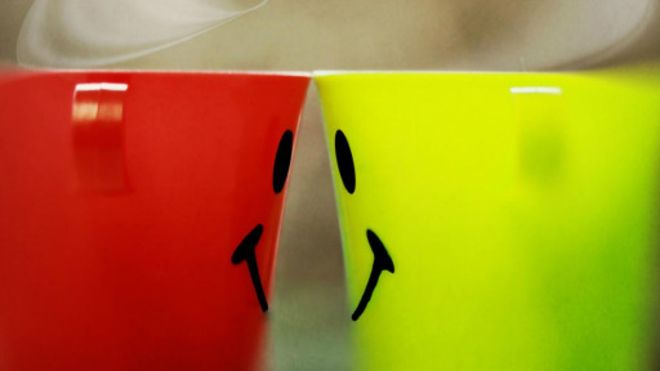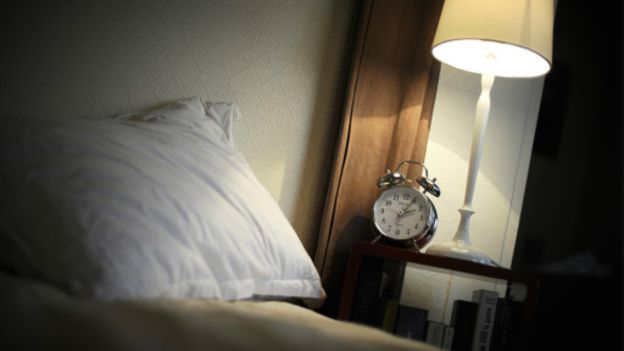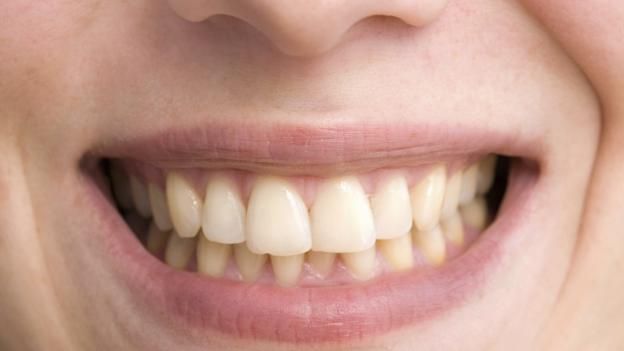茶和咖啡哪个更好?
BBC大卫·罗布森(David Robson)(2016年2月19日)

(图片来源:Getty Images)
乔治·奥威尔(George Orwell)曾经写过这样一段话:“茶是英国的一大文明支柱。”然而,就连英国人自己也承认,我们的国饮正在面临各种咖啡发起的挑战。
尽管卷入这种火药味甚浓的竞争可能面临许多风险,但BBC Future还是决定对这两种饮品的相关指标展开一番对比。当然,从口味上讲,实在是众口难调,但我们还是梳理了各种科学文献,查找这两种饮品对我们身心健康产生的实际量化影响。
提神作用
咖啡因是很多人选择这两种饮料的主要原因;当我们早晨醒来依旧感觉困乏时,它可以充当我们身体引擎的润滑油。单纯从成分来看,咖啡在这方面遥遥领先:一杯茶的咖啡因含量约为一杯标准的发酵过滤咖啡的一半,前者为40毫克,后者为80至115毫克。然而,这未必能反映真实的提神作用。
“咖啡因的含量并不能反映全貌:我们的预期或许也会对自身的感受产生影响。”
有一项小规模的研究显示,当志愿者早晨喝过了茶或咖啡后,这两种饮料在随后的时间内产生的提神作用非常相似。尽管这项研究完全依靠志愿者自己报告的感受,但反应时间等更加客观的指标同样未能显示出明显差异。事实上,当你大量饮用茶水,使之达到与咖啡等效的强度时,提神作用反而更加明显。
科学家就此认定,咖啡因含量并不能反应全貌:我们的预期或许也会对自身感受产生影响;也有可能是因为我们喜欢的味道和气味唤醒了我们的意识。
结论:与逻辑相悖的是,茶的提神作用与咖啡相同。二者打平。
睡眠质量
当你准备入睡时,咖啡和茶之间的最大差异或许才能真正体现出来。

萨里大学的研究人员发现,喝咖啡的人在夜间往往更难入睡
英国萨里大学(University of Surrey)的研究人员对比了同一天内摄入等量茶水或咖啡的人后发现,尽管这两种饮品对于集中白天的注意力都发挥了类似的作用,但喝咖啡的人在夜间往往更难入睡——或许是因为较高的咖啡因含量最终开始对你起作用。
相比而言,喝茶的人睡眠时间更长,状态也更加放松。
结论:茶可以提供很多与咖啡相同的益处,但却不会引发失眠——在这一局中明显胜出。
牙齿着色
与红酒一样,咖啡和茶也都会给洁白的牙齿染上一层暗淡的黄色或棕色。但哪一种饮品的着色力更强呢?

牙科医生表示,茶的天然染料比咖啡更容易附着在牙釉质上(图片来源:Getty Images)
多数牙医的意见似乎都很统一,他们认为,茶的天然染料比咖啡更容易附着在牙釉质上——尤其是当你使用的漱口水中包含洗必泰这种常见的抗菌剂时,这种物质似乎能够吸引并附着在微观粒子上。
结论:如果你想拥有完美的笑容,那么两害相权取其轻,咖啡可能更适合你。
安神作用
在英格兰,人们往往都会使用“茶水和同情”来安慰心情苦闷的朋友——他们认为,一杯伯爵茶可以治疗受伤的心。事实上,的确有证据表明茶可以起到安神的作用:与喝洋柑橘薄荷茶的人相比,经常喝茶的人在面对令人不安的环境时(例如公开演讲)往往表现得更加镇静。整体而言,一天喝3杯茶的人患抑郁症的风险比不喝茶的人降低37%。
“有证据表明茶可以起到安神的作用。”
咖啡却没有这样的效果,甚至有报告显示,咖啡会让人神经紧张。但也有一些证据表明,这种饮品同样有益于保持长期心理健康。最近的“元分析”(汇总了30多万参与者的研究结论)发现,每天喝一杯咖啡似乎能将患抑郁症的风险降低8%。相比而言,其他饮品(例如甜味软饮料)只会增加心理健康问题发生的风险。

萨里大学的研究人员发现,喝咖啡的人在夜间往往更难入睡
我们需要有保留地看待这个问题:尽管科学家已经尽力,但在这种大规模流行病研究中,却很难排除其他影响因素——不过,这两种饮品可能都提供了一些营养成分,可以降低应激反应,并促进长期心理健康。
结论:从有限的证据来看,这一局打平。
有益身体健康
同样也有一些值得关注的初步研究表明,咖啡和茶都有许多其他有益健康的好处。例如,每天喝几杯咖啡或茶水都能降低患糖尿病的风险。(具体能带来多大好处仍然没有定论,目前的估计在5%至40%之间。)不过,由于无咖啡因的咖啡也能起到同样的作用,所以可能是其他营养成分改善了新陈代谢,使之仍然可以高效地处理血糖,而不会对胰岛素感到迟钝——这正是糖尿病的成因。
“每天喝几杯咖啡或茶水似乎都能降低患糖尿病的风险。”
这两种饮品似乎也都能对我们的心脏起到一定的保护作用,但咖啡的证据略微明确一些。不过,茶似乎在预防一系列癌症方面效果更好——这可能源自它所富含的抗氧化剂。
结论:再次打平——这两种饮品都有益身体健康。总结:由于英国人更希望茶能胜出,所以不得不承认,在比较这两种饮品的过程中的确存在一些个人偏好。单纯从有益睡眠的角度来看,我们认为茶比咖啡更好。
Tea or coffee: Which drink is better for you?
By David Robson,19 February 2024
George Orwell may have written that “tea is one of the mainstays of civilization in this country” – but even we British have to acknowledge that our national drink is facing stiff competition from the espressos, cappuccinos, and lattes invading our shores.
Despite the dangers of wading into such a charged argument, BBC Future decided to weigh up the relative merits of each drink. There’s no accounting for taste, of course, but we have combed the scientific literature for their real, measurable effects on our body and mind.
The wake-up call
For many, the caffeine kick is the primary reason we choose either beverage; it’s the oil to our engines when we’re still feeling a bit creaky in the morning. Based purely on its composition, coffee should win hands down: a cup of tea has about half the dose (40 milligrams) of the stimulant caffeine that you would find in a standard cup of brewed filter coffee (80 to 115 milligrams). Yet this doesn’t necessarily reflect the jolt of the wake-up call.
Caffeine dose is not the whole story: perhaps our expectations also determine how alert we feel
Dosing subjects with either tea or coffee, one (admittedly small) study found that both beverages left subjects feeling similarly alert later in the morning. Although that study was based on self-reported feelings of alertness, clear differences have failed to emerge in more objective measures of concentration, either – such as reaction times. Indeed, when you dose up on tea made to the equivalent strength as coffee, it actually proves to be more effective at sharpening the mind.
The scientists conclude that the caffeine dose is not the whole story: perhaps our expectations also determine how alert we feel, or it could be that it’s the overall experience of the tastes, and smells, of our favourite drink that awakens our senses.
Verdict: Against logic, tea seems to provide just as powerful a wake-up call as coffee. It’s a draw.
Sleep quality
The biggest differences between coffee and tea may emerge once your head hits the pillow.
Comparing people drinking the same volume of tea or coffee over a single day, researchers at the University of Surrey in the UK confirmed that although both drinks lend similar benefits to your attention during the day, coffee drinkers tend to find it harder to drop off at night – perhaps because the higher caffeine content finally catches up with you.
Tea drinkers, in contrast, had longer and more restful slumbers.
Verdict: Tea offers many of the benefits of coffee, without the sleepless nights – a clear win.
Tooth staining
Along with red wine, coffee and tea are both known to turn our pearly whites a murky yellow and brown. But which is worse?
Most dentists seem to agree that tea’s natural pigments are more likely to adhere to dental enamel than coffee’s – particularly if you use a mouthwash containing the common antiseptic chlorhexidine, which seems to attract and bind to the microscopic particles.
Verdict: If you want a perfect smile, coffee may be the lesser of two evils.
A balm for troubled souls…
In England, it’s common to give “tea and sympathy” to a distressed friend – the idea being that a cup of Earl Grey is medicine for troubled minds. In fact, there is some evidence that tea can soothe your nerves: regular tea drinkers do tend to show a calmer physiological response to unsettling situations (such as public speaking), compared to people drinking herbal infusions. Overall, people who drink three cups a day appear to have a 37% lower risk of depression than those who do not drink tea.
There is some evidence that tea can soothe your nerves
Coffee doesn’t have the same reputation; indeed, some report that it makes them feel like their nerves are jangling. Yet there is some evidence that it too may protect against long-term mental health problems. A recent “meta-analysis” (summarising the results of studies involving more than 300,000 participants) found that each cup of coffee a day seems to reduce your risk of developing depression by around 8%. In contrast, other beverages (such as sweetened soft drinks) only increase your risk of developing mental health problems.
We need to take such results with a pinch of salt: despite the scientists’ best efforts, in this kind of large epidemiological study it’s hard to rule out other factors that may be behind the link – but it could be that both drinks offer a cocktail of nutrients that dampen down stress responses and boost mood in the long-term.
Verdict: Based on this limited evidence, it’s a draw.
…and a balm for bodies
Similarly tantalising, though preliminary, epidemiological studies have suggested that both coffee and tea offer many other health-giving benefits. A few cups of either beverage a day appears to reduce your risk of diabetes, for instance. (The exact size of the benefit is still under discussion – estimates vary from around 5 to 40%.) Since even decaf coffee confers the same benefits, it seems likely that other nutrients may be oiling the metabolism so that it can still efficiently process blood glucose without becoming insensitive to insulin – the cause of diabetes.
A few cups of either beverage a day appears to reduce your risk of diabetes
Both drinks also seem to moderately protect the heart, although the evidence seems to be slightly stronger for coffee, while tea also appears to be slightly protective against developing a range of cancers – perhaps because of its antioxidants.
Verdict: Another draw – both drinks are a surprising, health-giving elixir.
Overall verdict: Much as we Brits would have liked tea to come out the clear victor, we have to admit there is little between the two drinks besides personal taste. Based solely on the fact that it allows you to get a better night’s sleep, we declare tea the winner – but why not share your own thoughts with us through social media?